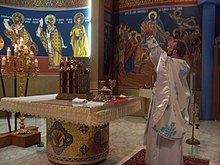
Back العبادة في المسيحية Arabic Богаслужэнне Byelorussian Bohoslužba Czech Gudstjeneste Danish Lobpreis und Anbetung German Diservo Esperanto Culto cristiano Spanish Jumalateenistus Estonian Gudstænasta Faeroese Hoʻomana Kalikiano HAW
This article has multiple issues. Please help improve it or discuss these issues on the talk page. (Learn how and when to remove these template messages)
|


| Part of a series on |
| Christianity |
|---|
 |
In Christianity, worship is the act of attributing reverent honour and homage to God.[1] In the New Testament, various words are used to refer to the term worship. One is proskuneo ("to worship") which means to bow down to God or kings.[2]
Throughout most of Christianity's history, corporate Christian worship has been liturgical, characterized by prayers and hymns, with texts rooted in, or closely related to, the Bible (Scripture), particularly the Psalter, and centered on the altar (or table) and the Eucharist; this form of sacramental and ceremonial worship is still practiced by the Catholic, Eastern Orthodox, Lutheran and Anglican churches, and Methodism to a lesser extent. In the Charismatic tradition worship is viewed as an act of adoration of God, with a more informal conception. Among certain Christian denominations, such as those of traditional Anabaptism, the observance of various ordinances rooted in Scripture occurs during Christian worship, such as feetwashing, anointing with oil, and the wearing of headcoverings by women.
The term liturgy is derived from the Greek leitourgia meaning "public service" and is formed by two words: "laos" (people) and "ergon" (work), literally "work of the people". Responsorial prayers are a series of petitions read or sung by a leader with responses made by the congregation. Set times for prayer during the day were established (based substantially on Jewish models), and a festal cycle throughout the Church year governed the celebration of feasts and holy days pertaining to the events in the life of Jesus, the lives of the saints, and aspects of the Godhead.
A great deal of emphasis was placed on the forms of worship, as they were seen in terms of the Latin phrase lex orandi, lex credendi ("the rule of prayer is the rule of belief")—that is, the specifics of one's worship express, teach, and govern the doctrinal beliefs of the community. According to this view, alterations in the patterns and content of worship would necessarily reflect a change in the faith itself. Each time a heresy arose in the Church, it was typically accompanied by a shift in worship for the heretical group. Orthodoxy in faith also meant orthodoxy in worship, and vice versa. Thus, unity in Christian worship was understood to be a fulfillment of Jesus' words that the time was at hand when true worshipers would worship "in spirit and in truth" (John 4:23).
- ^ "worship", Dictionary.com Unabridged, Random House, retrieved 4 Sep 2013
- ^ Called to Worship: The Biblical Foundations of Our Response Vernon Whaley - 2009 - In the Greek, the word for worship, proskuneo, means to express deep respect or adoration—by kissing, with words, or by bowing down. Associated words include epaineo, "to commend or applaud"; aineo, "to praise God"; and sebomai,"
© MMXXIII Rich X Search. We shall prevail. All rights reserved. Rich X Search